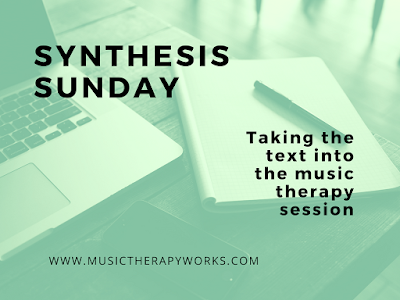Synthesis Sunday: Thinking More About Trauma-Informed Care
Now that I have taken up the role of Internship Director/Supervising Music Therapist again, I am finally getting an opportunity to put my Trauma-Informed Care Trainer Certification to work. (Also, you will be hearing lots and lots about my interns and how they challenge me to think about music therapy from a different perspective than my own!) One of the training topics that the trainers are trying to insist that my interns sit through is "Trauma Sensitive Care." I refused the topic (mainly because I have sat through it and it is pretty much worthless) stating that I would take care of that training myself. In retrospect, I have not told anyone at work that I am a T-IC certified trainer, so that may be some of the insistence on their parts, though I doubt it would make much of a difference if I told them that fact...
I digress...
One of my future interns is very focused on working with persons through a T-IC focus, so I'll be spending time talking to that intern about what she already knows and putting things into practice within my person-centered, humanistic philosophy of music therapy. We will talk about all of this during our extra discussion times (not during consultation/supervision) because this is extra information and extra training. (I will talk about this very important topic with all of my interns, not just the one in the future...)
The training that I know starts with the facts. Statistics about people out there in the world who have experienced trauma are staggering. The part of the training that I am still working out is what this means in my small part of the music therapy world.
So, I am constantly thinking about this topic as I am working in my clinic with my clients. I am thinking about how to provide my clients with T-IC music therapy sessions while I am composing new songs, while I am in the middle of sessions, and while I am doing my documentation. What I cannot seem to figure out is if this perspective changes anything in how I do my job - at this time, it does not seem to change much.
Is this right? Should being exposed to a different set of terminology change how I do what I do? I am really not sure.
I have always practiced from a person-centered perspective. I strive to meet each one of my clients where they are - in terms of energy, emotion, interest, and interaction. Music therapy is different for each person who comes through my sessions, and I feel that it should be different to support each person. I think that this perspective and the ideas of T-IC work well with one another, but I often think that we are simply dressing the sheep in different clothing and calling them something else. Do you know what I mean?
For me, in my music therapy environment, with my music therapy clients, being Trauma-Informed means that I understand the neurology behind trauma, and I continue to meet each client I serve in the moment of music therapy interaction.
I hope that's enough.
I digress...
One of my future interns is very focused on working with persons through a T-IC focus, so I'll be spending time talking to that intern about what she already knows and putting things into practice within my person-centered, humanistic philosophy of music therapy. We will talk about all of this during our extra discussion times (not during consultation/supervision) because this is extra information and extra training. (I will talk about this very important topic with all of my interns, not just the one in the future...)
The training that I know starts with the facts. Statistics about people out there in the world who have experienced trauma are staggering. The part of the training that I am still working out is what this means in my small part of the music therapy world.
So, I am constantly thinking about this topic as I am working in my clinic with my clients. I am thinking about how to provide my clients with T-IC music therapy sessions while I am composing new songs, while I am in the middle of sessions, and while I am doing my documentation. What I cannot seem to figure out is if this perspective changes anything in how I do my job - at this time, it does not seem to change much.
Is this right? Should being exposed to a different set of terminology change how I do what I do? I am really not sure.
I have always practiced from a person-centered perspective. I strive to meet each one of my clients where they are - in terms of energy, emotion, interest, and interaction. Music therapy is different for each person who comes through my sessions, and I feel that it should be different to support each person. I think that this perspective and the ideas of T-IC work well with one another, but I often think that we are simply dressing the sheep in different clothing and calling them something else. Do you know what I mean?
For me, in my music therapy environment, with my music therapy clients, being Trauma-Informed means that I understand the neurology behind trauma, and I continue to meet each client I serve in the moment of music therapy interaction.
I hope that's enough.


Comments
Post a Comment